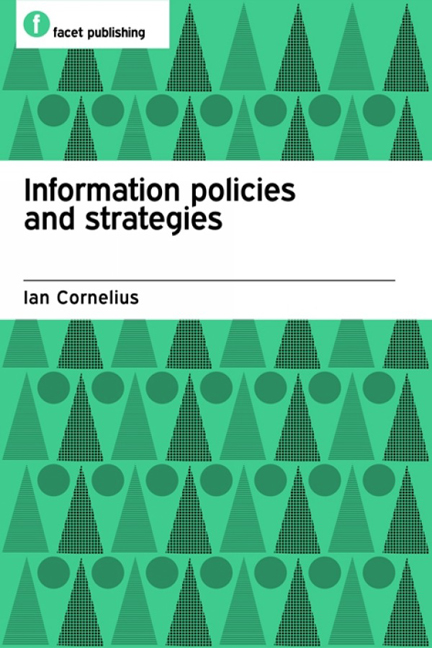Book contents
- Frontmatter
- Dedication
- Contents
- Preface
- 1 Introduction
- Part 1 Contexts for information policy
- 2 Globalization and information societies
- 3 Information policy and the public sphere
- 4 Information rights and information policy
- Part 2 Information policy sectors
- Part 3 Conclusion
- References and reading list
- Index
4 - Information rights and information policy
from Part 1 - Contexts for information policy
Published online by Cambridge University Press: 08 June 2018
- Frontmatter
- Dedication
- Contents
- Preface
- 1 Introduction
- Part 1 Contexts for information policy
- 2 Globalization and information societies
- 3 Information policy and the public sphere
- 4 Information rights and information policy
- Part 2 Information policy sectors
- Part 3 Conclusion
- References and reading list
- Index
Summary
INFORMATION POLICY AS an issue of rights raises a completely different set of questions that lie outside the framework we have so far considered. Until now we have looked at information policies as parts of larger social forces and movements or as things that stand on their own within the structure of each society. If we look at rights we find that the standard statements about human rights include certain items that we can identify as information rights. No one has looked at information rights independently of other rights and it is not clear that a distinction between various sorts of rights can be made in that way. For example, most statements of rights include a right to freedom of religious belief or practice. This must include, for those religions that use them, the right to use their particular sacred documents. So is freedom of religion an information right? Most people would consider it as a sort of right that stood on its own rather than being one of a group of other rights.
There is also the separate question of how we treat religious claims to the unquestionable status of their own central documents – mostly we do not privilege documents or their contents, so are we inventing a privileged status for religious documents, and does that status subtend from currently practised religions only – in other words is it dependent on the existence of living practitioners – or are all religious documents of all known religions past and present included? If we extend the notion of what counts as a document to include various artefacts with religious or other significance we find that the idea of rights must become very extensive. Commonly rights, especially when expressed as human rights, are held to exist for living humans, and the rights associated with them are cited as rights for any human who happens to be living. So, the right to freedom of expression must exist even if no human being is currently seeking to exercise that right, as must the right to privacy and the right to have certain sorts of information – for example, the right to know of any charges brought against you, and the right to know who your accusers are. These are rights about information too.
- Type
- Chapter
- Information
- Information Policies and Strategies , pp. 63 - 82Publisher: FacetPrint publication year: 2010



